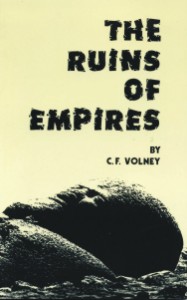The Ruins of Empires
 Author: C. F. Volney
Author: C. F. Volney
First Published: 1793
Paperback: 221 pages
Publisher: Black Classic Press. 1991
Language: English
Translated into English: 1802
ISBN: 0-933121-52-0
Details: If books were to be judged of by their volume, the following would have but little value; if appraised by their contents, it will perhaps be reckoned among the most instructive.
In general, nothing is more important than a good elementary book; but, also, nothing is more difficult to compose and even to read: and why? Because, as every thing in it should be analysis and definition, all should be expressed with truth and precision. If truth and precision are wanting, the object has not been attained; if they exist, its very force renders it abstract.
The first of these defects has been hitherto evident in all books of morality. We find in them only a chaos of incoherent maxims, precepts without causes, and actions without a motive. The pedants of the human race have treated it like a little child: they have prescribed to it good behavior by frightening it with spirits and hobgoblins. Now that the growth of the human race is rapid, it is time to speak reason to it; it is time to prove to men that the springs of their improvement are to be found in their very organization, in the interest of their passions, and in all that composes their existence. It is time to demonstrate that morality is a physical and geometrical science, subject to the rules and calculations of the other mathematical sciences: and such is the advantage of the system expounded in this book, that the basis of morality being laid in it on the very nature of things, it is both constant and immutable; whereas, in all other theological systems, morality being built upon arbritary opinions, not demonstrable and often absurd, it changes, decays, expires with them, and leaves men in an absolute depravation. It is true that because our system is founded on facts and not on reveries, it will with much greater difficulty be extended and adopted: but it will derive strength from this very struggle, and sooner or later the eternal religion of Nature must overturn the transient religions of the human mind.
This book was published for the first time in 1793, under the title of The French Citizen’s Catechism. It was at first intended for a national work, but as it may be equally well entitled the Catechism of men of sense and honor, it is to be hoped that it will become a book common to all Europe. It is possible that its brevity may prevent it from attaining the object of a popular classical work, but the author will be satisfied if he has at least the merit of pointing out the way to make a better.

